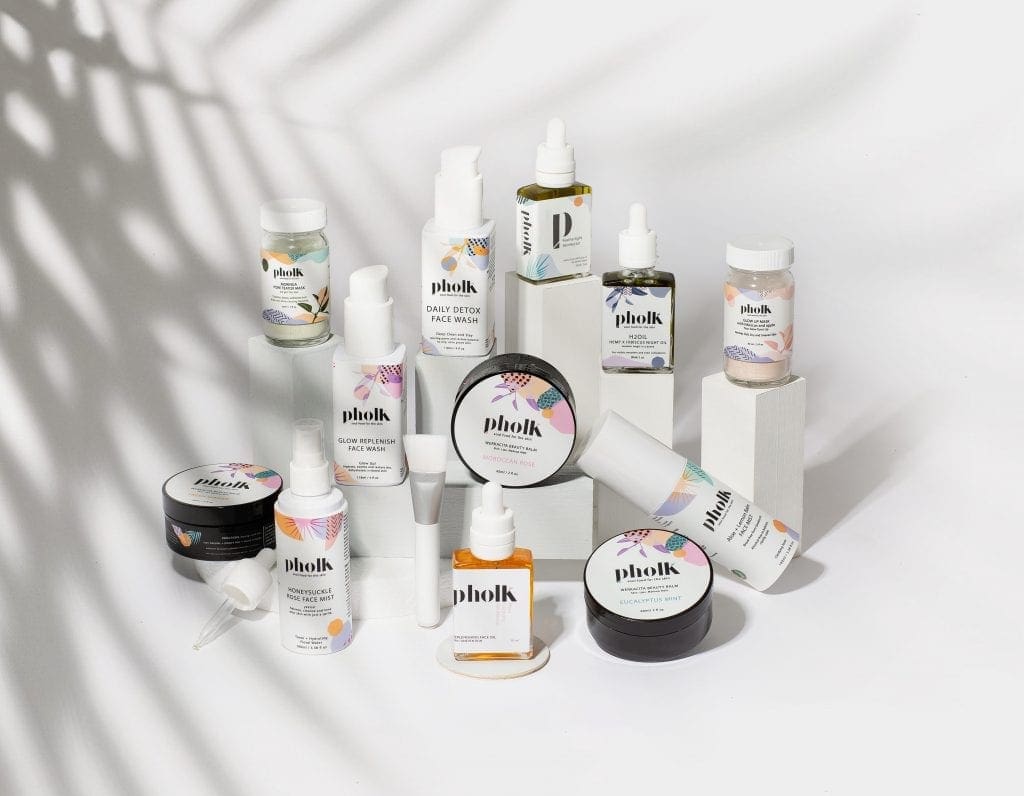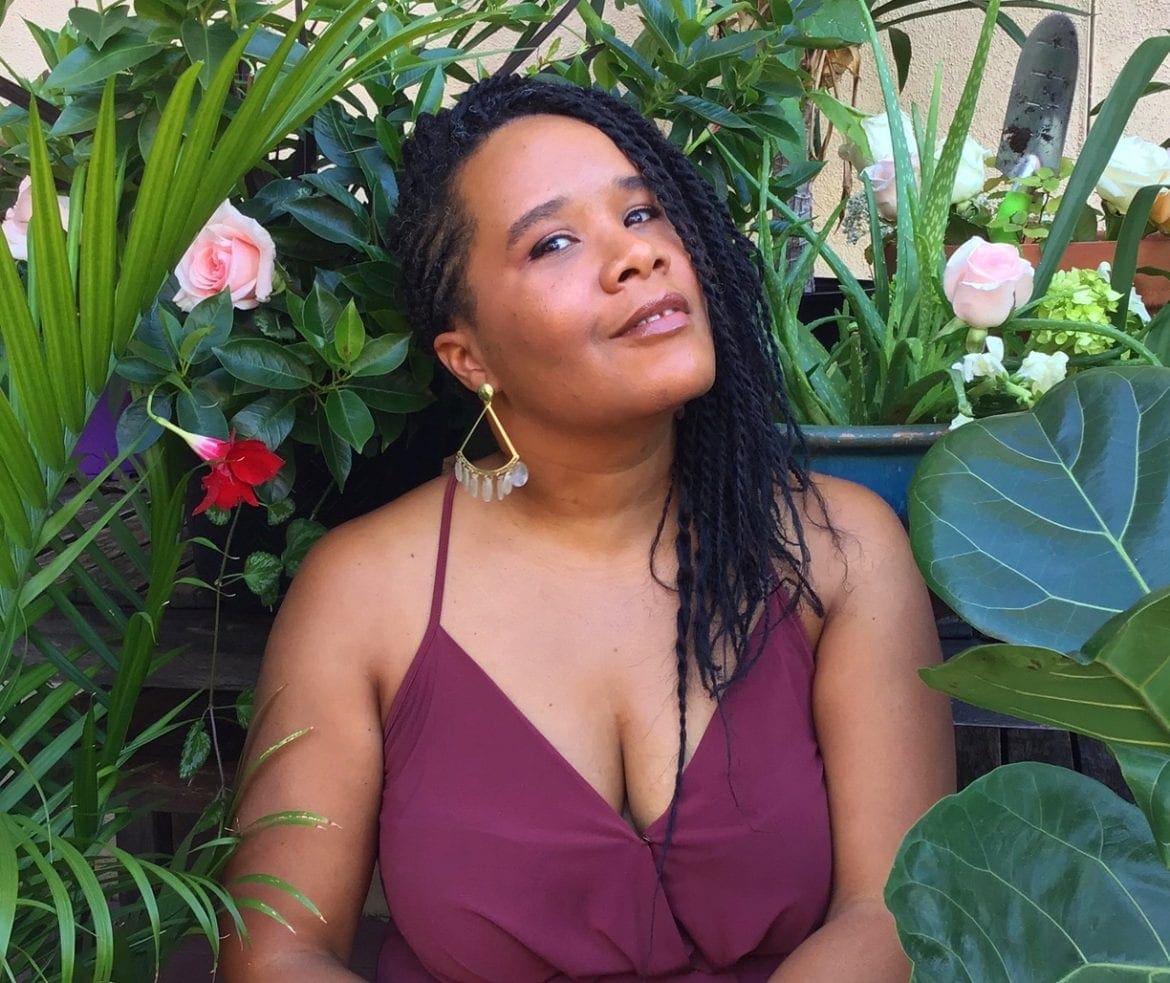Niambi Cacchioli, owner and founder of Jersey City-based brand Pholk Beauty, spends her time creating skincare products that respond to women’s needs. Much of her work is inspired by her background as an African diaspora historian and fifth-generation gardener. As a Kentucky native, she grew up “green-living” and has been able to introduce this element to her beauty products.
Pholk wasn’t Cacchioli’s first foray into the beauty industry. Her previous venture carried the same values of Pholk at its core, but after realizing how distant the business was from her own personality, she shut it down. Once she let her true self show through the business, Cacchioli was able to bring Pholk Beauty alive with soaring sales.
However, Cacchioli says she couldn’t have been able to do this without the brand’s Jersey roots. Hudson County has been central to the success of her business, and its growth has since been carried by a diverse team of New Jersey employees. Cacchioli has found that during a pandemic, it has been especially important to hire more local Black and brown talent and source her ingredients directly from farmers overseas.
After speaking with Cacchioli, I was able to learn more about her journey from academia to making oils and bath salts for herself and ultimately, launching Pholk Beauty—a brand that aims to help women in an educational, resourceful and gentle way.
1. What inspired the launch of Pholk Beauty in 2018?
I’m a fifth-generation gardener. My family is from the deep South and eventually moved up to Kentucky. And so, I grew up with grandparents and parents that were used to true country, Southern living—everybody had a garden.
My grandfather grew up on a farm and in some ways, that connected me to a lot of the communities that I encountered for work as an academic where I would go to places like Iran, Turkey and Morocco. Just different places where there were other small communities of African descendants and they also lived very close to the land—gardening, farming, cooking fresh food. This is all something that felt very familiar to me.
In the South, there are all of these commonalities and things that feel familiar and I just wanted to explore that more and I didn’t want to explore it as an academic. As someone who was working on the history of Black folk in the Middle East, I became really interested in the migration, history, diversity and the healing practices of Black folk.
2. How has travel connected you to the beauty industry?
I just like seeing what different cities bring out of my personality. I think living in London was my first real “city” experience, so it brought out a lot of my urban side. Whereas when I lived in Paris, I definitely connected more with my maker side. I just needed to have some things that were grounding for me and making things with my hands—bath bombs, oils, salts and face mists, all of that stuff that I do now—helped me feel more connected to home.
It was also a really good way for me to find a pathway into Paris because I would go to the apothecaries and take little workshops. It helped me learn French and it helped me connect with North African healing and West African healing. It’s like a way of me feeling both close to my ancestors and also making connections with other communities of color.

Pholk Beauty Product Line l Photo courtesy of Pholk Beauty
3. You had another beauty brand before Pholk. What was rebranding like for you?
Rebranding for me really was me allowing myself to show up as who I am. As someone who’s kind of introverted, when I first founded my business, I really just wanted to fit in. I looked at what people were doing on the left of me and on the right of me and then I kind of did my own version of that. Although it had local success and I loved that brand, I wasn’t really putting my own personality and my own values into it because, in many ways, I still identify as a southern Black girl from Kentucky. I just wasn’t sure what that would feel like here in the Northeast because I was very new.
I think Pholk really was, more than anything else, me just feeling more comfortable showing up in Jersey as myself. You know, as a Black, southern, fifth-generation gardener who has this sort of dreamy afro-pop view of life. I didn’t see any brands like that in Jersey. After a while I was like, you know what, you don’t have to be anything but yourself, right?
4. How would you describe your relationship with customers?
I mean, I definitely have an auntie relationship with my consumers. Especially up until the shutdown, our doors were open. I remember right before COVID hit trying to figure out how I was going to greet people if I couldn’t hug them. I even put a post on our Instagram that we’re going to do the hip bump, you know? That will be our thing. And so I just love customers but I also want our staff to be safe and I want our customers to be safe.
5. Pholk prides itself on being a vegan, all-natural brand. How accessible are those types of ingredients to source?
The vegan part is not hard. I mean, basically as long as I’m not using any animal-based products. However, there are so many other ingredients. I could go to the local health food store and just buy what I need there. But, I love my relationships with my suppliers and I do it sort of backwards. Some of the things that I’ve formulated, my Honeysuckle Rose, for example, are formulated with my suppliers in mind. Before I made any product, I just sat down with the distiller and asked, “what are all of the plants that you’re distilling?” and you know, she told me all the stories of the different plants. Then I asked, “what’s the harvesting cycle? What’s the scale that you can do it?” So even before I start with the product in mind, I’m talking to the supplier so that I know that I’m not going to overwhelm them.
6. What has been the biggest challenge for you as an up-and-coming businesswoman?
I love diving into taboos and exploring them. But the taboo I think the beauty industry is hesitant to talk about is hues—as in, different views and different skin tones. For one, nobody wants to offend anyone. And two, in cosmetology school, you don’t really get trained on the skin concerns of women of color. You kind of have to just get your esthetician license and then go out into the community and figure it out. I think that was probably one of the biggest challenges.
I also sense that there’s a taboo in natural skincare. People don’t want to offend Black and brown women by talking about our skin needs, but, for me, that’s the joy. We get to celebrate all of our hues and we get to really dive deep into what is done and what function does it play. When I rebranded as Pholk, one of the main challenges was how to create a brand that connects and reflects the concerns of women of color, but is still welcoming of people of all walks of life.
7. How has your background as a Jersey City resident influenced this business, if at all?
Even though I am a proud Kentuckian, I definitely know that I could only build this brand in Jersey. Jersey City, Hudson County, Hoboken—they really cheer their founders on. They’re like family and treat us like family. They really want the best for us. Jersey City in particular is the most diverse city in the country—this is a huge benefit and you can definitely see it in the brand. I think if I had created this brand anywhere else it would have looked very different. I’m just very grateful to have the Jersey roots.
8. What would you say is the most important aspect of your work?
It’s really redefining what is beautiful and taking it from this idea that there are beauty standards, to really opening it up to beauty being a conversation. That’s definitely important for me, personally. My core goal is to really explore cooperative economics because, you know, I’m a sociologist and I think that there’s a lot of opportunity in beauty for Black and brown women. Not even counting men, Black and brown women buy eight times the amount of skincare and personal care as conventional consumers. And that means that there’s a lot of opportunities not just for founders like me, but also I’m based in a historically African-American neighborhood in Jersey City. I hire locally. So as my business grows, I’m able to also hire more Black and brown talent which has been hugely important during COVID.
I also work with a number of small farmers and ingredient producers in the South, the Caribbean, West Africa, North Africa. Opportunities for me are also opportunities for my suppliers. One example of this is that I get the Moringa oil for our rose gardenia skin nectar from another Black-owned brand based in Ghana. They use their Moringa oil for their beauty products, but then they sell their surplus to brands like mine. I have award-winning products that work on everybody’s skin. I’m able to run a business, but also, my Moringa oil supplier, he works with 5,000 farmers in West Africa. So it’s a win-win and, you know, that is the power of beauty. You can really change people’s lives if you think intentionally about how you’re hiring, how you’re manufacturing and where you’re sourcing from.
9. What have you learned from your experience owning a business?
I’ve learned a couple of things. One is that when you hire diverse talent and you have diverse voices around the table, it makes your brand stronger. I’m a 47-year-old Black Southerner academic. I have a very specific experience and a very specific worldview that will connect with certain people. But the growth of Pholk really is due to having such a diverse staff. Our staff looks like Jersey City and it’s been hugely beneficial to have different points of view and different voices. And I mean, it sounds really cheesy, but the other one is to trust myself and to show up as I am.
10. What future plans do you have for Pholk Beauty?
We really want Pholk Beauty to be a national brand and to make sure that anyone looking for gentle, vegan, natural, culturally-conscious skincare, has it readily available to them.
Main image of Niambi Cacchioli courtesy of Pholk Beauty
About the Author/s
Natalie is an editorial assistant at The Digest and a student at Ramapo College of New Jersey. She is a Bergen County native and has a particular interest in feature journalism. When she’s not writing, she’s driving around with her friends or at the nearest Dunkin’ Donuts.
